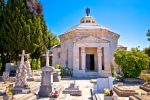A Guide to Mormon Funeral Traditions
- November 24, 2021
- Celebrations of Life
Mormon funerals are generally viewed as celebratory opportunities, with a blend between a somber and joyful atmosphere. Mormons believe in the afterlife and choose to view funeral services as an inevitable transition that brings peace for those who have passed and brings them close to the source of life. Guests can usually expect songs, hymns, prayers, modest clothing, and family members who retain a spirit of hope during the service.
Beyond Mormon funerals and religious traditions, the ceremony serves as a reminder to those who mourn the loss that everything’s not lost and that there is more to experience in an eternal afterlife. It also provides loved ones of the deceased with comfort and helps make the transition easier as much of the decision-making is already established by the funeral customs and traditions. Without further ado, here is a detailed guide on what you can expect at a Mormon funeral.
Mormon View of Death
For Mormons, death is viewed as a separation of the spirit from the body, with the spirit remaining alive once the physical death has taken place. Mormons believe in the resurrection of the dead and Jesus’s atonement that has ensured eternal life for all who believe. Since Mormons firmly believe in the resurrection of Christ and Eternal life, they often refrain from wearing religious embellishment portraying a crucified Christ. When attending a Mormon funeral, you’d likely want to refrain from wearing a cross or crucifix necklace as this can be taken as a form of disrespect. Crosses are not a part of the Mormon faith.
What Happens After The Death
Once a death occurs, the bishop is typically contacted to begin getting everything ready for the ceremony and burial. The bishop is not obligated but typically helps by notifying friends and family, preparing the avenue, obituary, and making sure all of the traditions are met.
Although the bishop is immediately contacted, the burial usually takes place within one week of death but is never held on a Sunday. The garments of the deceased play a crucial role, with Mormons putting a lot of emphasis on the kind of clothing to be worn by the deceased. The temple garments are white underwear provided by the church — however, this is only if the deceased was a baptized believer. Only then, the body gets to be buried in the temple garments and clothing.
Where Does a Mormon Funeral Take Place?
Mormon funeral services are typically held in a Mormon church, but they can also be held at the graveside, chapel, or funeral home. Many times, in areas where there is a high Mormon population, these may have their own cemetery restricted for only members of the church. They are usually adjacent or close to a Mormon church. The funeral service is usually 60 to 90 minutes in length and is oftentimes conducted by a bishop of the church.
Mormon Funeral Clothing Etiquette
When attending a Mormon funeral, guests are typically welcomed to wear any clothing they feel most comfortable with. Wearing black is not necessary. In fact, most attendees choose to avoid the color black and opt for simply solid patterns or white shirts. However, wearing black is not prohibited. Bright colors are usually not a good idea; it’s better to opt for more conservative colors and patterns.
Men usually wear a white shirt and a tie, sometimes including a suit. Women are often encouraged to wear simple and conservative clothing typically covering the knees and shoulders. No head covering is required in most cases.
What Kinds of Gifts Can You Bring or Send to a Mormon Funeral?
Like most religious funerals, it is ok to send flowers under Mormon funeral etiquette. Flowers have long been considered a kind gesture of sympathy and support in the Mormon faith. These can be sent to the funeral home, church, or home of the bereaved. Although flowers are ok, you might want to refrain from sending flowers in the shape or form of a cross.
Mormon Funeral Service Traditions
Most Mormon funerals follow and honor the same traditions or customs. Most of the traditions held at Mormon funerals are held with the main purpose of honoring more than an obligation. With this in mind, here are some of the most common traditions seen at Mormon funeral ceremonies:
- The funeral service usually starts with sacred music.
- A prayer for the family and a message of Atonement follows next.
- It’s common for friends and family to give a eulogy or talk about the deceased as the ceremony proceeds.
- A final prayer asking for the plot to be protected as well as the family of the deceased is usually the closing element.
Overall, as a rule of thumb, you can usually expect songs, hymns, prayers, and an honoring ceremony toward the deceased when attending a Mormon funeral. Even guests that are not Mormons can expect to fully participate in the ceremony and traditional customs. As a guest, when attending a Mormon funeral, you’ll want to show respect toward the deceased and the religious traditions and customs.
Related Articles

Headstone vs. Tombstone vs. Gravestone
- August 10, 2022
- Celebrations of Life

How to Create a Family Heirloom
- August 2, 2022
- Celebrations of Life

What to Do With a Widow’s Wedding Ring
- July 26, 2022
- Celebrations of Life

Examples of Great Epitaphs
- July 19, 2022
- Celebrations of Life

What Is a Mausoleum? The Pros and Cons
- July 19, 2022
- Celebrations of Life
